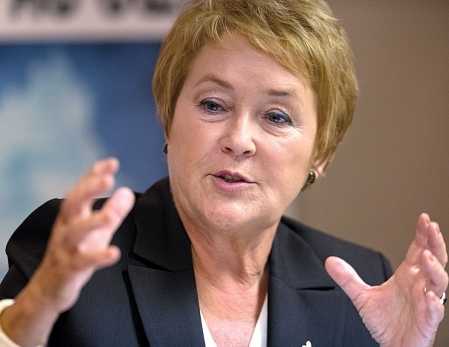People may not recognize the name of Alexandre Auguste Ledru-Rollin, a nineteenth-century French politician and revolutionary, but they will have heard of his famous comment: “There go my people, I must find out where they are going so I can lead them.”
It’s like that in Quebec today, provincial election day. The electorate is moving — the pollsters and pundits detect the movement — but where the people are heading, where they will end up, and who will lead them is almost anyone’s guess. The situation reminds me of the 2011 federal election and the New Democratic Party’s “Orange Wave,” led by the late Jack Layton. The NDP came out of nowhere, literally, to capture 59 of Quebec’s 75 seats in Parliament (and 103 of 308 nationally).
A surge of that magnitude may not be in the cards today, but something is happening. To the extent that there is consensus, it is that the campaign has been all-round nasty and the governing Parti Québécois is in deep, deep trouble. Premier Pauline Marois has led the worst campaign, muddled and off-message, anyone has witnessed in many years. The tumbrels will roll for her if she fails to win a majority; they will roll even if she manages to cling to another minority. Her self-designated successor will have to wait a long time before he will be able to crown himself President Péladeau (or perhaps he would prefer Emperor Pierre Karl the First) of a sovereign Quebec.
It is a reflection of the PQ’s disastrous campaign, that the polls seem to be pointing to a return of the Liberals, out of office for just 18 months, still scandal-plagued and now led by the thoroughly underwhelming Philippe Couillard (he makes the late Liberal premier Robert Bourassa seem charismatic by comparison). But no one has the faintest idea whether it would be a Liberal majority or minority.
The polls this past weekend are little or no help. A Léger Marketing survey, published Sunday morning, put the Liberals at 38 per cent, nine points ahead of the PQ. Given the way support is split among the other parties, those 38 points could produce a Liberal majority. (A new projection by ThreeHundredEight.com, a poll aggregator, gives the Liberals 69 of the 125 seats in the National Assembly.) Or it could give the Liberals a minority — or nothing.
The huge unknown is the young Coalition Avenir Québec, which occupies the centre-right of the spectrum — conservative on fiscal issues and liberal on social ones. Led by François Legault, a former PQ cabinet minister, the CAQ is the only party with any momentum. While the PQ and the Liberals have been frozen in place or slipping slightly, the CAQ has kept moving ahead. As of Sunday, it had reached 23 per cent, up eight points since the third week of March.
The trend is what has Quebec politicians excited — and worried. The CAQ could end up with just a dozen seats, or it could end up in power. (It won 19 seats in the 2012 election that brought Marois and the PQ to office.) In this election, it has managed to keep out of the mudslinging between the PQ and the Liberals; it has sensed the public mood by declaring a ten-year moratorium on referendums; and its leader, Legault, is seen to have out-performed his opponents in the televised leaders’ debates.
Written off early in the campaign, the CAQ has surged in the past two weeks. “When you look at polls, what’s important are trends,” Legault said the other day. “There is a possibility that we will form a majority government, the CAQ, according to the trends.”
The CAQ is certainly the spoiler in this election. But a CAQ government, majority or minority? An impossible dream? Perhaps. But perhaps not. But when the electorate starts to move, no one knows where it will stop. Let’s not forget Jack Layton and 2011.
Cambridge resident Geoffrey Stevens, an author and former Ottawa columnist and managing editor of The Globe and Mail, teaches political science at Wilfrid Laurier University and the University of Guelph. His column appears weekly in Waterloo Region Record and Guelph Mercury. He welcomes comments at [email protected]



